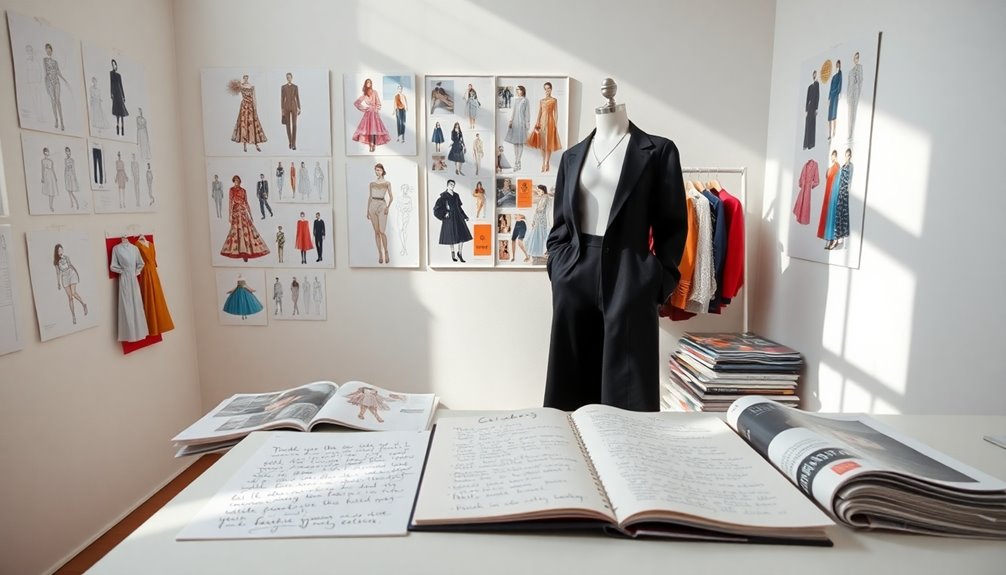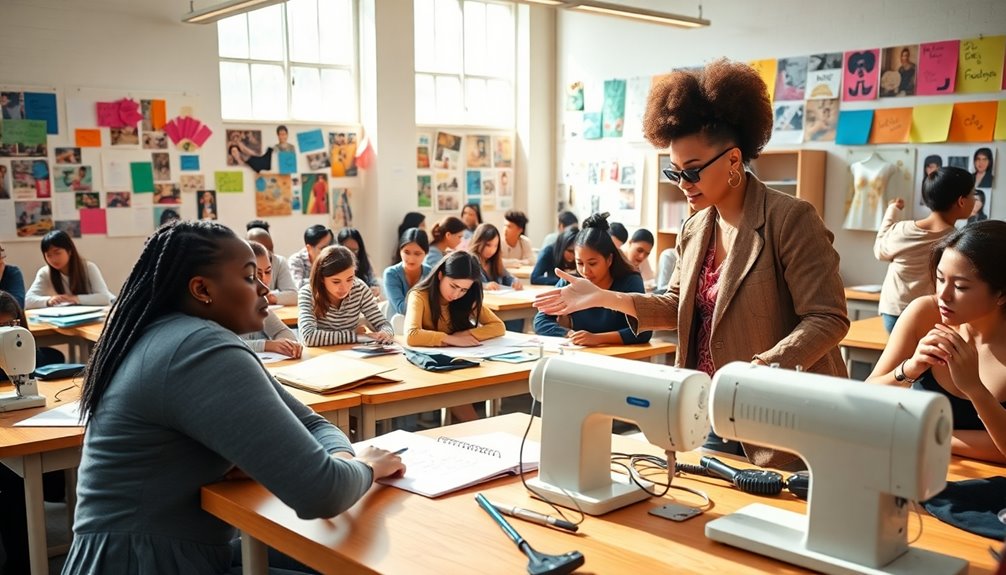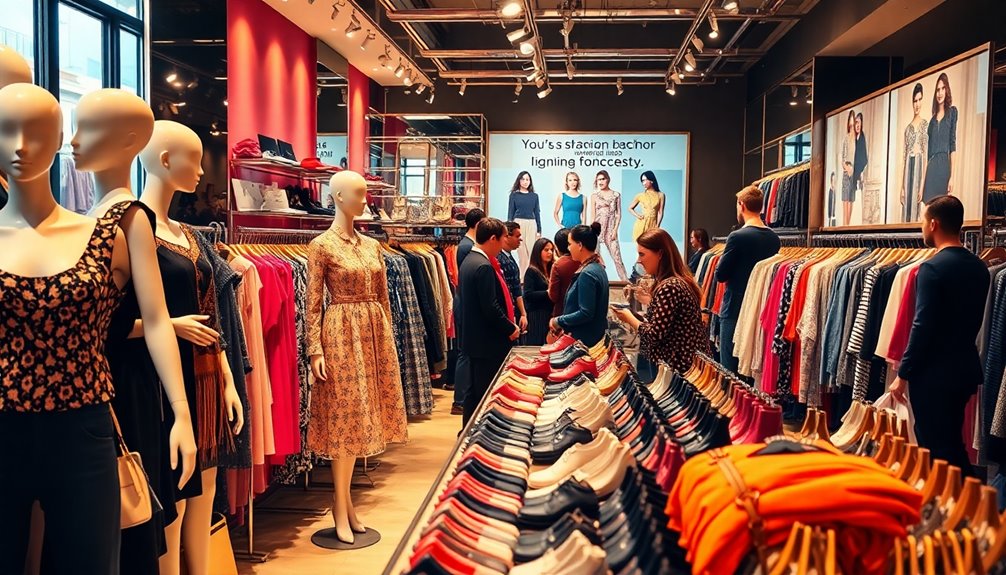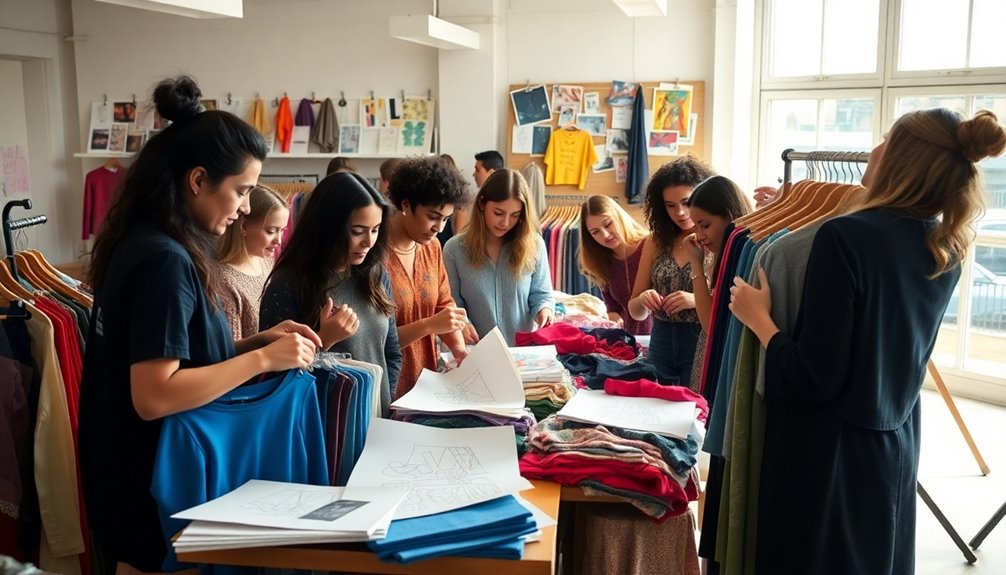To break into the fashion industry, start by identifying your desired role—like designer or stylist—and choose a relevant college major. Network with industry professionals, create your own opportunities through blogs or social media, and gain experience with internships and volunteering. Consider taking online courses to sharpen your skills and think about relocating to a fashion capital for more opportunities. There's so much more you can learn to navigate this exciting field effectively.
Key Takeaways
- Identify your desired fashion role and pursue relevant education or internships to gain necessary skills and experience.
- Leverage networking opportunities by connecting with industry professionals through events, social media, and cold outreach.
- Create a fashion blog or social media portfolio to showcase your style and insights, attracting potential employers.
- Gain hands-on experience by securing internships or volunteering at fashion events to build your resume and network.
- Commit to continuous learning through online courses and certifications to stay relevant and enhance your expertise in the industry.
Identify Your Desired Fashion Role

How can you pinpoint the right role in the fashion industry? Start by identifying your desired fashion role, whether it's a fashion designer, stylist, or buyer.
Each position has unique responsibilities and skill sets, so research daily tasks and expectations to see what resonates with you. Engaging in internships or entry-level positions gives you hands-on experience, helping you refine your focus.
Don't underestimate the power of networking; building industry contacts can provide insights into various roles and potential career paths.
Additionally, utilize online resources like industry blogs and fashion forums to stay updated on trends and job opportunities.
With the right approach, you'll be well on your way to getting a job that excites you in the fashion world.
Choose a Relevant College Major

Choosing a relevant college major can set the foundation for your success in the fashion industry.
Whether you opt for fashion design, merchandising, or even graphic design, each path helps you develop transferable skills that align with your career goals.
Choosing Related Majors
While diving into the fashion industry, selecting a relevant college major can greatly shape your career path. Consider pursuing majors like fashion design, merchandising, marketing, or textile science. These fields equip you with essential skills and knowledge. Internships during your studies can provide hands-on experience, helping clarify your interests and guiding your career decisions.
| Major | Key Skills Gained | Potential Career Roles |
|---|---|---|
| Fashion Design | Creativity, technical skills | Designer, stylist |
| Merchandising | Analytical thinking, trend analysis | Buyer, merch planner |
| Marketing | Communication, branding | Brand manager, marketer |
| Textile Science | Material knowledge, innovation | Textile developer |
| Graphic Design | Visual communication, creativity | Fashion illustrator |
Aligning your major with your aspirations strengthens your resume and appeals to employers.
Develop Transferable Skills
Building on the foundation laid by selecting a relevant major, developing transferable skills is essential for your success in the fashion industry. Your major should ideally focus on areas like fashion design, marketing, or merchandising, but don't overlook the value of graphic design or English.
These majors help you hone skills in visual communication and critical writing, both vital in various roles. Engage in internships or projects related to your field; they provide hands-on experience that boosts your marketability.
As you collaborate and create, you'll develop essential skills like teamwork, problem-solving, and effective communication. These transferable skills make you a strong candidate, whether you're eyeing a position in marketing, public relations, or design within the fashion industry.
Align Education With Goals
Aligning your education with your career goals is essential for breaking into the fashion industry. Choosing a relevant college major, like fashion design, merchandising, or marketing, equips you with the foundational knowledge needed for specific roles.
Majors in art history, graphic design, or business can also enhance your creativity and market understanding. While fashion schools are beneficial, many successful professionals come from diverse educational backgrounds, proving that transferable skills matter.
It's vital to pursue courses that develop your critical writing and communication abilities, especially for roles in public relations and marketing. Engaging in internships or practical experiences related to your major will help clarify your career aspirations and provide valuable insights into what the fashion industry demands.
Leverage Your Network for Opportunities

To break into the fashion industry, tapping into your existing network can be one of the most effective strategies. Start by reaching out to friends or family in the industry for internship opportunities or job openings. Don't hesitate to send cold emails to professionals, introducing yourself and expressing your interest in their work.
Engaging in online communities and attending industry events can also enhance your networking efforts. Use the table below to guide your actions:
| Action | Purpose |
|---|---|
| Reach out to connections | Inquire about job openings |
| Send cold emails | Seek mentorship opportunities |
| Attend fashion events | Build professional relationships |
Having strong communication skills can significantly improve your chances of making meaningful connections in the industry.
Create Your Own Opportunities

While seeking opportunities in the fashion industry is important, creating your own path can be equally transformative. Start a fashion blog to showcase your unique style and insights, attracting potential employers and industry professionals.
Utilize social media platforms like Instagram to build a visual portfolio, displaying your work while engaging with a larger audience. This approach can lead to valuable networking opportunities and collaborations that might just land you that coveted fashion job. Additionally, leveraging AI tools for content personalization can enhance your engagement on these platforms, making your work stand out even more.
Don't overlook TikTok, where sharing your creativity can catch the eye of talent scouts searching for fresh voices.
Attend local fashion networking events to meet industry professionals and establish yourself as an active community member, paving the way for future opportunities.
Take charge of your journey!
Gain Experience Through Volunteering

Volunteering can be a game-changer in your quest to break into the fashion industry, as it offers hands-on experience and invaluable insights. By volunteering at fashion shows, you'll gain experience that enhances your understanding of event organization and backstage operations.
Many fashion organizations welcome volunteers, allowing you to contribute to successful events while building practical skills. This commitment not only enhances your resume but also showcases your enthusiasm to learn, which is essential for those starting out.
Plus, engaging in volunteer work helps you develop a portfolio of experiences and references, crucial for future internships or jobs. Ultimately, volunteering opens doors to networking opportunities with industry professionals, giving you a clearer view of various roles and career paths.
Start Working in Retail

Starting out in retail is one of the most effective ways to break into the fashion industry. Retail positions often require minimal experience, making them accessible if you're enthusiastic to learn.
Working in these roles helps you develop essential customer service skills and enhances your communication abilities, both important in fashion. You'll gain firsthand insights into current fashion trends and consumer preferences, which are critical for future roles in design, buying, or styling.
Plus, retail jobs create valuable networking opportunities with designers, buyers, and other industry professionals.
While the national average salary for retail positions, like sales associates, is around $29,000, advancing into management can lead to higher earnings and greater responsibilities in the fashion world.
Pursue Fashion Internships

Pursuing fashion internships is vital for kickstarting your career in the industry.
These opportunities not only boost your resume but also connect you with experienced professionals who can guide you.
Importance of Internships
Internships in the fashion industry are invaluable for anyone looking to jumpstart their career. They provide hands-on experience and exposure that are essential for aspiring professionals.
During your internship, you'll gain insights into daily operations, industry standards, and specific roles within fashion, helping you figure out where your interests lie.
Moreover, internships often lead to full-time job offers, with about 60% of interns securing permanent positions with their companies.
Interning at reputable fashion houses enhances your resume and opens doors for networking with industry professionals, which is significant for career growth.
Best of all, many internships require minimal prior experience, making them accessible for students and newcomers enthusiastic to break into the competitive fashion landscape.
Grab this opportunity!
Finding Internship Opportunities
Securing a fashion internship can feel challenging, but with the right approach, you'll uncover a wealth of opportunities.
Start by researching fashion brands that resonate with your interests; this targeted approach can lead to more meaningful experiences.
Don't underestimate the power of networking—attend fashion events and connect with industry professionals to discover hidden internship opportunities.
Leverage platforms like LinkedIn and fashion-specific job boards to streamline your search and connect directly with potential employers.
Tailor your resume and cover letter to showcase your relevant skills and passion for the industry, as many internships require strong applications.
Maximizing Internship Experience
While gaining hands-on experience in the fashion industry, you can maximize your internship by actively seeking out opportunities to learn and grow.
Here are some strategies to enhance your experience:
- Take initiative on projects to showcase your skills.
- Build relationships with colleagues for valuable networking opportunities.
- Attend industry events and fashion shows to broaden your exposure.
- Ask for feedback regularly to improve your performance.
- Document your accomplishments to enhance your resume.
Take Online Courses for Skill Enhancement

If you're looking to gain a competitive edge in the fashion industry, taking online courses can be a game-changer. Platforms like Coursera and Skillshare offer affordable or even free courses in fashion design, merchandising, and marketing, allowing you to enhance your skills at your own pace.
Completing these online courses not only bolsters your resume with certifications but also shows your commitment to professional development. Many courses include practical assignments, enabling you to build a portfolio that showcases your creativity to potential employers.
Additionally, engaging in the learning communities associated with these courses provides valuable networking opportunities and insights from industry professionals and peers. Embrace online learning, and watch your skills soar!
Freelance for Fashion Publications

Freelancing for fashion publications can be a fantastic way to immerse yourself in the industry and hone your writing skills. This path allows you to build a portfolio while gaining exposure to industry standards and trends.
Here are some tips to get started:
- Explore various niches like articles, product reviews, and trend forecasts.
- Start pitching to niche fashion blogs and magazines for visibility.
- Accept lower pay initially to gain experience and credibility.
- Focus on networking with editors and fellow writers on social media.
- Continuously improve your writing and adapt to industry changes. Additionally, staying updated on current fashion trends can help you write more relevant and engaging content for your audience.
Consider Relocating to a Fashion Capital

Relocating to a fashion capital can be a game-changer for your career, offering unparalleled access to opportunities in the industry.
Cities like New York, Paris, Milan, and London are bustling with job openings and networking opportunities that can elevate your professional journey.
By immersing yourself in these vibrant environments, you'll gain insights into the latest trends and styles, fueling your creativity.
Plus, major fashion capitals host numerous events and shows where you can connect with influential professionals and brands.
While the cost of living in these cities can be high, careful budgeting and planning can make the move worthwhile.
Embrace the chance to learn from the best and watch your career in fashion flourish.
Frequently Asked Questions
How to Break Into the Fashion Industry With No Experience?
If you want to break into the fashion industry with no experience, start by seeking entry-level roles like retail associate or fitting room attendant.
These positions help you learn about customer service and the industry.
Consider volunteering at fashion events to gain hands-on experience and build connections.
Create a visual portfolio on Instagram to showcase your style.
Finally, network actively by attending events and reaching out to industry professionals for advice.
Where Do I Start if I Want to Learn Fashion?
If you're looking to commence a fashionable journey, start by exploring various avenues within the industry that pique your interest.
Investigate online courses or workshops to enrich your understanding and skills. Consider enrolling in a related college major to build a solid foundation.
Additionally, seek internships or volunteer opportunities for hands-on experience. Following fashion influencers and brands on social media can also provide inspiration and keep you updated on the latest trends.
How Hard Is It to Break Into the Fashion Industry?
Breaking into the fashion industry can be tough. You're up against many talented individuals, and competition is fierce. It requires persistence and a strong commitment to your goals.
However, don't let that discourage you! Use networking and informational interviews to learn more about the field and uncover hidden opportunities.
Even entry-level roles can provide valuable experience and help you build a portfolio that sets you apart over time.
Keep pushing forward!
How Do I Become a Fashion Stylist With No Experience?
To become a fashion stylist with no experience, start by creating a strong portfolio that highlights your unique style through mood boards and styled photoshoots.
Volunteer to style friends or local events to gain hands-on experience.
Use social media platforms like Instagram to showcase your work and connect with industry professionals.
Take online courses to sharpen your skills, and network by attending fashion events or seeking mentorship from established stylists.
Conclusion
Breaking into the fashion industry can feel like trying to find your way through a maze, but with determination and the right strategies, you'll carve your own path. Remember, every successful designer or stylist started somewhere, and your journey is just beginning. Stay curious, keep learning, and don't hesitate to take risks. By actively seeking opportunities and building connections, you'll soon find yourself making strides in this vibrant world of fashion. Embrace the adventure ahead!









